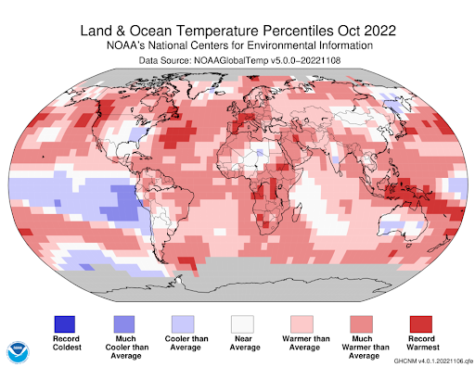2022’s Devastating Climate Changes
December 16, 2022
Have you ever wondered how much of a miracle the spring-like 50 degrees in November is? Well, it’s not as good as you think. According to the United Nations, climate change is a long-term shift in temperatures and weather patterns. Since the 1800s, human activities have been the main cause of climate change through the burning of fossil fuels like coal, oil, and gas which produces heat-trapping gasses. In the past year, climate change has negatively impacted our coral, great lakes, ocean levels, and many more. In recent year climate change has been increasingly destructive toward our planet.
An in-depth report regarding climate change called the Summary for Policymakers, written by dozens of scientists and experts around the world goes into detail about all of the human effects on the environment in 2022. “The rise in weather and climate extremes has led to some irreversible impacts as natural and human systems are pushed beyond their ability to adapt” The report describes the way that our planet has been affected by us very well, but it gets even scarier when you look at the specific impacts. The report claims high confidence that the total area destroyed by wildfires has increased due to humans in the past year. It’s easy for some people to ignore climate change because things like coral and trees dying off don’t directly affect them yet, but wildfires kill thousands of people every year. This should be a clear and tragic sign to people that things need to change. It should be apparent that climate change is very real and getting worse, and it’s human-inflicted.
Everybody knows the dangers of climate change, but they might not know how bad it is. As it turns out, climate change is hitting faster than scientists thought. According to the latest report from a United Nations climate panel, the negative impacts of climate change are initiating much faster than scientists predicted less than a decade ago. Many impacts that are occurring are unavoidable thus affecting the world’s most vulnerable populations says the UN Climate Panel. Meaning that in 2022 the rapidity of climate change is increasing every moment and the impacts are irreversible thus negatively affecting our planet without a cure. In the article Climate change is hitting the planet faster than scientists originally thought – Nature they address the UN climate panel by highlighting that “collective action from governments to both curb greenhouse-gas emissions and prepare communities to live with global warming could yet avert the worst outcomes.” (…) “ With support from our government we could change the outcome of our future”. When we change our every day to day routines within our community it could make a huge impact on our enviornment.

Great Lakes
Our great lakes are being affected by climate change in this recent year thus leading to droughts. We interviewed a SPASH Biology-Macro teacher Mr. Akemann. Mr. Akemann knows a lot about climate change due to his role in our environment and school. He does many things to help our planet like putting solar panels on his property, conserving, and many more. The primary things he is aware of are the impacts of climate change on the great lakes. Furthermore, Mr. Akemann describes, “Waterflow in the Mississippi is so bad that it concentrates the problem of runoff further downstream” meaning that our great lakes are being affected. There is no media coverage of the significant drought situation in Minnesota. The water flow in the Mississippi is so bad and concentrates our runoff, getting plugged up. To create change there has to be a collective effort. Mr. Akemann warns, “People not doing anything is the scariest thing. Naysayers continue to deny the evidence. Inaction. People who don’t believe in climate change have a lack of understanding. Denial is a fear response.” Thus, conservation is the number one easiest, and cheapest way to help battle climate change. Once we get past our tipping point, the one we are in now, it is going to be very hard to create a significant change in our environment
Additionally, small island communities have been affected an enormous amount by climate change in 2022. The Maldives, the Soloman islands, The Republic of Fiji, the Marshall Islands, and the Republic of Palau (just to name a few) are all populated islands that are at great risk of sea levels rising. In an interview with Biology teacher Mr. Akemann, he brought up the heartbreaking point that the people who have the smallest impact on climate change, such as island communities (who are close to carbon neutral), are affected the most by global warming. In a separate

interview with SPASH Junior Alex Reynolds, when asked about these island communities he had this to say: “it’s like the same as other bodies of water, and that since they are so close to the shore, and have a much smaller land area they are at a much higher risk from rising sea levels.” It’s good to see more awareness of this issue in the interview. Alex brought up a good point that since they have so much less land mass and are completely surrounded by water, the sea levels rising will have a detrimental impact on these communities.
The warming planet
The warming of the planet this year isn’t just speculation either, there are hard facts to show it. The NOAA’s October 2022 climate report shows some shocking statistics. The overall temperature of the Northern hemisphere, including ocean temperatures, is the second hottest on record. Only in 2015 were the temperatures hotter, and the difference is only 0.04 degrees Fahrenheit. However, The issue is much bigger than just the Northern hemisphere.
“January to October was characterized by warmer-than-average conditions across much of North America, Europe, Asia, Northern and Southern Africa, Northern Oceania, and central and Eastern South America. Much of the Atlantic and Northern and Western Pacific oceans, and parts of the Eastern Indian Ocean, had warmer-than-average year-to-date temperatures. The January–October Northern Hemisphere land and ocean temperature ranked fourth warmest on record.”

This data from NOAA shows that it’s not just the Northern hemisphere that is warming up. Different places all around the world are experiencing hotter-than-average temperatures. This is not a mere coincidence.
Benefits of climate change
In another light, there are benefits to climate change. “The chief benefits of global warming include fewer winter deaths; lower energy costs; better agricultural yields; probably fewer droughts; maybe richer biodiversity.” From the article Why Climate Change is Good for the World – Spectator from May 2013. So, the many advantages to climate change seem like very good things but as time continues go on the advantages will be outweighed by the intensity. It is concerning the uncertainty of “maybe” and “probably” and it indicates it’s not a very sound claim. “Both Britain and Greece see mortality rates rise by 18 percent each winter. Especially cold winters cause a rise in heart failures far greater than the rise in deaths during heatwaves.” The winters getting less cold seems to only benefit those two places instead of benefiting the whole world.
Plants need CO2
In addition to the claimed benefits of climate change, our carbon dioxide levels are benefiting our ecosystem. “The greatest benefit from climate change comes not from temperature change but from carbon dioxide itself. It is not pollution, but the raw material from which plants make carbohydrates and thence proteins and fats.” “As it is an extremely rare trace gas in the air — less than 0.04 percent of the air on average — plants struggle to absorb enough of it.” The co2 might be better for the plants but for our atmosphere, not so much. Co2 heats and breaks down our atmosphere thus creating climate change. “The latest IPCC report is admirably frank about this, reporting ‘no significant observed trends in global tropical cyclone frequency over the past century … lack of evidence and thus low confidence regarding the sign of trend in the magnitude and/or frequency offloads on a global scale.” This means that just because it hasn’t happened yet doesn’t mean that our actions will eventually affect our planet drastically.
In conclusion, numerous reports and statistics collected by experts around the world clearly show an increase in the intensity of climate change in 2022. Island communities are being devastated, the great lakes region is facing major droughts, and October 2022 was the second warmest ever recorded. While climate change has become much more severe, there is still hope. We can come back from this through conservation and a collective goal for everyone to do what they can for the environment, whether that be recycling more, composting, putting up solar panels, or even investing in an electric car. It’s up to all of us to help curb the climate crisis and create change for a better future.





































































